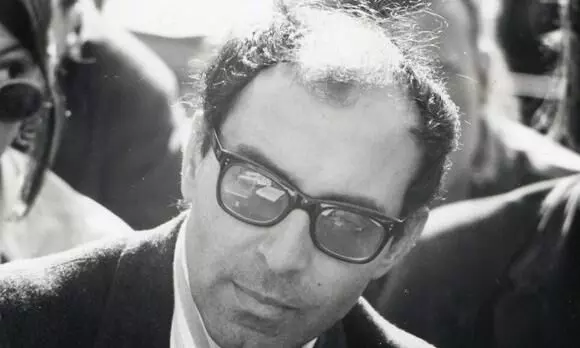
Jean-Luc Godard, French New Wave Cinema exponent, dies at 91
text_fieldsGeneva: The French-Swiss movie maker, also known as the "enfant terrible" of the French New Wave, Jean-Luc Godard, died on Tuesday at the age of 91. Godard is known for revolutionising popular cinema in 1960, debuting with his feature flick, "Breathless". He had remained one of the globe's most important and provocative filmmakers, Associated Press reports.
Godard's partner Anne Marie Mieville informed that the director breathed his last peacefully and was surrounded by his loved ones at his home in the Swiss town of Role, Lake Geneva.
French President Emmanuel Macron paid his tribute by saying, "We have lost a national treasure, the eye of a genius." Godard was the most iconoclastic of the New Wave directors, and he invented a resolutely modern, intensely free art form, Macrone added.
Godard's film boosted Jean-Paul Belmondo's stardom, and on the other hand, his controversial modern nativity play "Hail Mary" got denounced by Pope John Paul II in 1985.
He had made a string of political and experimental films, which pleased only a few outside his fan circled and irked many critics.
Cannes Film Festival Director Thierry Fremaux said that he was "sad, sad. Immensely so" at the news of Godard's death.
Godard was born to a wealthy French-Swiss family on December 3, 1930, in Paris. However, he grew up in Nyon, Switzerland, and studied ethnology at the Sorbonne in Paris. He was attracted to the Latin Quarter "cine-club" after World War II. He built a friendship with future big-name directors like Francois Truffaut, Jacques Rivette and Eric Rohmer and, in 1950, founded the short-lived Gazette du Cinema. In 1952, he started writing for the prestigious movie magazine Cahiers du Cinema.
He attempted his first movie in 1951, after working on two films with Rivette and Rohmer. The attempt was while he was travelling with his father through North and South America, but he couldn't finish it.
He started a job as a construction worker on a dam project in Switzerland, and he used the payment from there to finance his first 20-minute documentary, "Operation Concrete", in 1954. It was about the building of the dam.
He returned to Paris and worked as a spokesman for an artists' agency later. In 1957, he made his first feature film, "All Boys Are Called Patrick", which got released in 1959. He started his second one, "Breathless", based on a story by Truffaut, and the breakthrough film got released in March 1960. It was Godard's biggest success.
Godard chose frequent jump-cuts instead of a conventional narrative style, which mixed philosophical discussions with action scenes. He also added references from Hollywood gangster movies and tributes to literature as well as visual arts.
Godard also launched what was to be career-long participation in collective film projects, contributing scenes to "The Seven Deadly Sins" along with directors such as Claude Chabrol and Roger Vadim. He also worked with Ugo Gregoretti, Pier Paolo Pasolini and Roberto Rossellini on the Italian movie "Let's Have a Brainwash," with Godard's scenes portraying a disturbing post-apocalypse world.
Godard, who was later to gain a reputation for his uncompromising left-wing political views, had a brush with French authorities in 1960 when he made "The Little Soldier." The movie, filled with references to France's colonial war in Algeria, was not released until 1963, a year after the conflict ended.
His work turned more starkly political by the late 1960s. In "Week-End," his characters lampoon the hypocrisy of bourgeois society even as they demonstrate the comic futility of violent class war. It came out a year before widespread anger at the establishment shook France, culminating in the iconic but short-lived student unrests of May 1968.
Godard harboured a life-long sympathy for various forms of socialism depicted in films ranging from the early 1970s to the early 1990s. In December 2007, he was honoured by the European Film Academy with a lifetime achievement award. Godard took potshots at Hollywood over the years.
He remained home in Switzerland rather than travel to Hollywood to receive an honorary Oscar at a private ceremony in November 2010 alongside film historian and preservationist Kevin Brownlow, director-producer Francis Ford Coppola and actor Eli Wallach.
His lifelong advocacy of the Palestinian cause also brought him repeated accusations of antisemitism, despite his insistence that he sympathised with the Jewish people and their plight in Nazi-occupied Europe.
In 2010, Godard released "Film Socialisme," a film in three chapters first shown at the Cannes Film Festival.
Godard married Danish-born model and actress Anna Karina in 1961. They divorced in 1965.
Godard married his second wife, Anne Wiazemsky, in 1967. He later started a relationship with Swiss filmmaker Anne-Marie Miéville. Godard divorced Wiazemsky in 1979 after he had moved in with Miéville to the Swiss municipality of Rolle, where he lived with her for the rest of his life.























